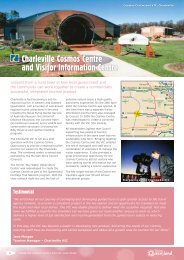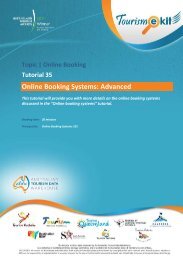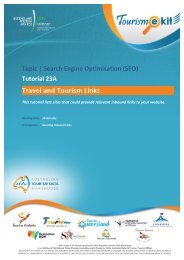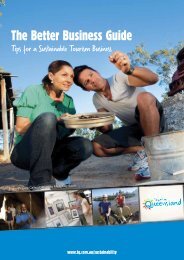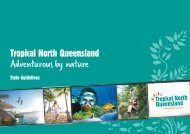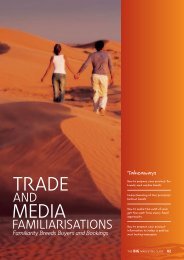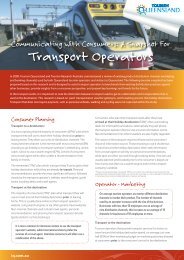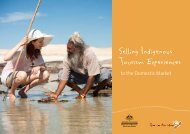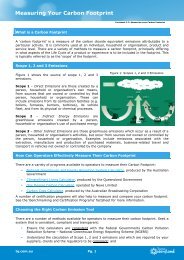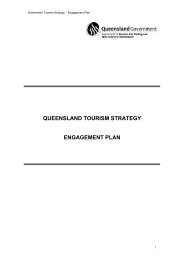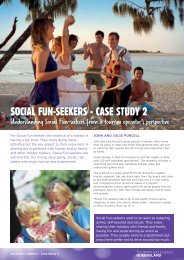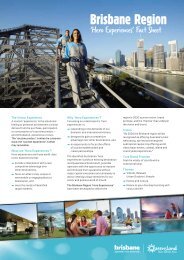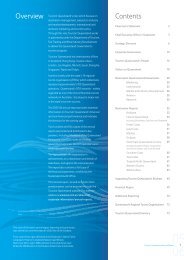Queensland Ecotourism Plan 2003-2008 - Tourism Queensland
Queensland Ecotourism Plan 2003-2008 - Tourism Queensland
Queensland Ecotourism Plan 2003-2008 - Tourism Queensland
Create successful ePaper yourself
Turn your PDF publications into a flip-book with our unique Google optimized e-Paper software.
EXECUTIVE SUMMARY<br />
<strong>Queensland</strong> is a well-known and recognised destination for ecotourism activities and<br />
experiences. Domestic and international visitors are drawn to <strong>Queensland</strong> by a combination of<br />
unique and diverse natural attractions and a tourism industry that offers a wide range of high<br />
quality ecotourism products. <strong>Queensland</strong>’s tourism industry has brought to fruition many of the<br />
potential benefits of ecotourism that were identified in the <strong>Queensland</strong> <strong>Ecotourism</strong> <strong>Plan</strong><br />
launched in 1997. Great achievements have been made in ‘best practice’ ecotourism<br />
developments in partnerships between various stakeholders including government, industry<br />
and community groups.<br />
Five years on from its launch a review of the implementation of the <strong>Queensland</strong> <strong>Ecotourism</strong><br />
<strong>Plan</strong> and extensive consultation with key stakeholders indicated a clear need to update the<br />
<strong>Plan</strong> and continue efforts to date in growing <strong>Queensland</strong>’s ecotourism industry by providing a<br />
consistent direction for planning, development, management and marketing.<br />
The Vision, Key Objectives and Action <strong>Plan</strong>s contained in the 1997 <strong>Queensland</strong> <strong>Ecotourism</strong><br />
<strong>Plan</strong> provided a solid framework for successful implementation of the <strong>Plan</strong>. The <strong>Queensland</strong><br />
<strong>Ecotourism</strong> <strong>Plan</strong> <strong>2003</strong>–<strong>2008</strong> presents an updated vision and definition of ecotourism in<br />
<strong>Queensland</strong>, reflecting development in the ecotourism industry and experience gained since<br />
the release of the 1997 <strong>Queensland</strong> <strong>Ecotourism</strong> <strong>Plan</strong>. The <strong>Queensland</strong> <strong>Ecotourism</strong> <strong>Plan</strong><br />
<strong>2003</strong>–<strong>2008</strong> recognises the clear focus and direction provided by the 1997 <strong>Queensland</strong><br />
<strong>Ecotourism</strong> <strong>Plan</strong> by retaining the four Key Objectives from that <strong>Plan</strong> but also adding a new Key<br />
Objective, Research, to provide a clear research agenda for the new <strong>Plan</strong>. An updated set of<br />
Action <strong>Plan</strong>s linked to each Key Objective provide the specific projects and activities that will<br />
underpin successful implementation of the <strong>Queensland</strong> <strong>Ecotourism</strong> <strong>Plan</strong> <strong>2003</strong>-<strong>2008</strong>.<br />
5<br />
An updated definition<br />
Since the launch of the 1997 <strong>Queensland</strong> <strong>Ecotourism</strong> <strong>Plan</strong>, there has been a continual process<br />
of raising the best practice standards of ecotourism as well as a growing understanding of the<br />
nature of the ecotourism industry in <strong>Queensland</strong>. These factors led to the need for an updated<br />
definition of ecotourism in <strong>Queensland</strong>:<br />
“<strong>Ecotourism</strong> encompasses a spectrum of nature-based activities that foster visitor<br />
appreciation and understanding of natural and cultural heritage and are managed to<br />
be ecologically, economically and socially sustainable.”<br />
This definition acknowledges diversity in the industry’s products, the role of natural and cultural<br />
heritage in ecotourism, and the importance of the ‘triple-bottom-line’ ecologically sustainable<br />
development (ESD) approach to managing ecotourism. That is, the need to address economic,<br />
environmental and social / cultural issues associated with any ecotourism development.<br />
<strong>Ecotourism</strong> in <strong>Queensland</strong><br />
<strong>Tourism</strong> is <strong>Queensland</strong>’s second largest export industry and fastest growing industry. <strong>Tourism</strong> is<br />
estimated to contribute $6.3 billion to the Gross State Product (arising from $14.6 billion<br />
expenditure) and directly creates 150,000 full time jobs (1999, <strong>Queensland</strong> Treasury). <strong>Tourism</strong><br />
offers rural and regional areas an alternative employment and income source to traditional<br />
rural and mining industries.



